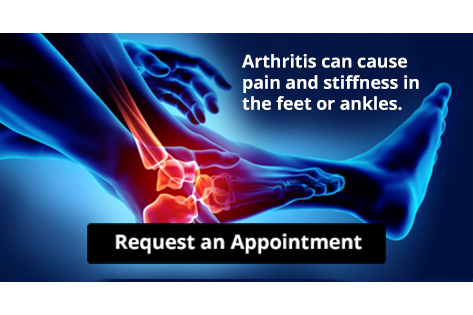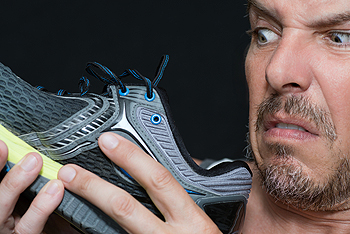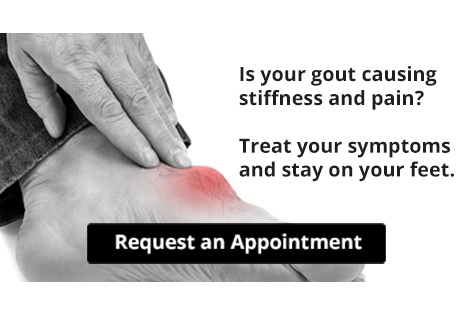Blog
Stretching the Feet to Prevent Injuries
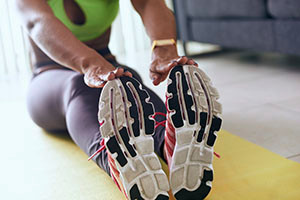 We put a great amount of pressure on our feet every day. Thus, they are quite prone to injury. Stretching the feet is an effective way to prevent affliction. There are some simple exercises to perform in order to keep the feet flexible. To begin, sit on the floor with your legs straight in front of you. Place a towel around your toes and pull them toward yourself. This should be a useful stretch for the whole lower half of your body. Next, find a chair, and attempt to lift the towel off of the ground with your toes. You should find that this strengthens the feet muscles. Another stretch while in a chair is to practice spreading your toes apart for a few seconds at a time. If you have steps in your home, you can put your toes on the edge of your steps, while alternating between lowering and lifting your heels. Finally, you can roll a small ball on the bottom of your foot while standing on a flat surface. Remember that all stretches and exercises must be done within moderation. If you have any questions, or would like additional stretching routines, be sure to contact a podiatrist.
We put a great amount of pressure on our feet every day. Thus, they are quite prone to injury. Stretching the feet is an effective way to prevent affliction. There are some simple exercises to perform in order to keep the feet flexible. To begin, sit on the floor with your legs straight in front of you. Place a towel around your toes and pull them toward yourself. This should be a useful stretch for the whole lower half of your body. Next, find a chair, and attempt to lift the towel off of the ground with your toes. You should find that this strengthens the feet muscles. Another stretch while in a chair is to practice spreading your toes apart for a few seconds at a time. If you have steps in your home, you can put your toes on the edge of your steps, while alternating between lowering and lifting your heels. Finally, you can roll a small ball on the bottom of your foot while standing on a flat surface. Remember that all stretches and exercises must be done within moderation. If you have any questions, or would like additional stretching routines, be sure to contact a podiatrist.
Why Stretching Is Important for Your Feet
Stretching the feet is a great way to prevent injuries. If you have any concerns with your feet consult with one of our podiatrists from The Podiatry Center, PC. Our doctors will assess your condition and provide you with quality foot and ankle treatment.
Stretching the Feet
Stretching the muscles in the foot is an important part in any physical activity. Feet that are tight can lead to less flexibility and make you more prone to injury. One of the most common forms of foot pain, plantar fasciitis, can be stretched out to help ease the pain. Stretching can not only ease pain from plantar fasciitis but also prevent it as well. However, it is important to see a podiatrist first to determine if stretching is right for you. Podiatrists can also recommend other ways to stretch your feet. Once you know whether stretching is right for you, here are some excellent stretches you can do.
- Using a foam roller or any cylindrical object (a water bottle or soda can will do), roll the object under your foot back and forth. You should also exert pressure on the object. Be sure to do this to both feet for a minute. Do this exercise three times each.
- Similar to the previous exercise, take a ball, such as a tennis ball, and roll it under your foot while seated and exert pressure on it.
- Grab a resistance band or towel and take a seat. If you are using a towel, fold it length wise. Next put either one between the ball of your foot and heel and pull with both hands on each side towards you. Hold this for 15 seconds and then switch feet. Do this three times for each foot.
- Finally hold your big toe while crossing one leg over the other. Pull the toe towards you and hold for 15 seconds. Once again do this three times per foot.
It is best to go easy when first stretching your foot and work your way up. If your foot starts hurting, stop exercising to ice and rest the foot. It is advised that you then see a podiatrist for help.
If you have any questions, please feel free to contact our office located in Millburn, NJ. We offer the newest diagnostic and treatment technologies for all your foot care needs.
Read more about How to Stretch Your FeetStretching the Feet to Prevent Injuries
 We put a great amount of pressure on our feet every day. Thus, they are quite prone to injury. Stretching the feet is an effective way to prevent affliction. There are some simple exercises to perform in order to keep the feet flexible. To begin, sit on the floor with your legs straight in front of you. Place a towel around your toes and pull them toward yourself. This should be a useful stretch for the whole lower half of your body. Next, find a chair, and attempt to lift the towel off of the ground with your toes. You should find that this strengthens the feet muscles. Another stretch while in a chair is to practice spreading your toes apart for a few seconds at a time. If you have steps in your home, you can put your toes on the edge of your steps, while alternating between lowering and lifting your heels. Finally, you can roll a small ball on the bottom of your foot while standing on a flat surface. Remember that all stretches and exercises must be done within moderation. If you have any questions, or would like additional stretching routines, be sure to contact a podiatrist.
We put a great amount of pressure on our feet every day. Thus, they are quite prone to injury. Stretching the feet is an effective way to prevent affliction. There are some simple exercises to perform in order to keep the feet flexible. To begin, sit on the floor with your legs straight in front of you. Place a towel around your toes and pull them toward yourself. This should be a useful stretch for the whole lower half of your body. Next, find a chair, and attempt to lift the towel off of the ground with your toes. You should find that this strengthens the feet muscles. Another stretch while in a chair is to practice spreading your toes apart for a few seconds at a time. If you have steps in your home, you can put your toes on the edge of your steps, while alternating between lowering and lifting your heels. Finally, you can roll a small ball on the bottom of your foot while standing on a flat surface. Remember that all stretches and exercises must be done within moderation. If you have any questions, or would like additional stretching routines, be sure to contact a podiatrist.
Why Stretching Is Important for Your Feet
Stretching the feet is a great way to prevent injuries. If you have any concerns with your feet consult with one of our podiatrists from The Podiatry Center, PC. Our doctors will assess your condition and provide you with quality foot and ankle treatment.
Stretching the Feet
Stretching the muscles in the foot is an important part in any physical activity. Feet that are tight can lead to less flexibility and make you more prone to injury. One of the most common forms of foot pain, plantar fasciitis, can be stretched out to help ease the pain. Stretching can not only ease pain from plantar fasciitis but also prevent it as well. However, it is important to see a podiatrist first to determine if stretching is right for you. Podiatrists can also recommend other ways to stretch your feet. Once you know whether stretching is right for you, here are some excellent stretches you can do.
- Using a foam roller or any cylindrical object (a water bottle or soda can will do), roll the object under your foot back and forth. You should also exert pressure on the object. Be sure to do this to both feet for a minute. Do this exercise three times each.
- Similar to the previous exercise, take a ball, such as a tennis ball, and roll it under your foot while seated and exert pressure on it.
- Grab a resistance band or towel and take a seat. If you are using a towel, fold it length wise. Next put either one between the ball of your foot and heel and pull with both hands on each side towards you. Hold this for 15 seconds and then switch feet. Do this three times for each foot.
- Finally hold your big toe while crossing one leg over the other. Pull the toe towards you and hold for 15 seconds. Once again do this three times per foot.
It is best to go easy when first stretching your foot and work your way up. If your foot starts hurting, stop exercising to ice and rest the foot. It is advised that you then see a podiatrist for help.
If you have any questions, please feel free to contact our office located in Millburn, NJ . We offer the newest diagnostic and treatment technologies for all your foot care needs.
Arthritis Can Cause Pain in the Feet and Ankles
Arthritis Can Cause Pain in the Feet and Ankles
Arthritis and the Toes
 One of the parts of the body arthritis can affect is the toes. The symptoms that often accompany this condition are pain in the toes while walking, and the formation of bumps on top of the toes as a result of friction in the joints. Many patients notice their toes becoming stiff, and it may be difficult to bend the big toe. Additionally, the toenails may become affected, and people who have this condition occasionally experience fevers. Rheumatoid arthritis is the most common form of this type of ailment, and typically affects the small joints in the foot. Psoriatic arthritis can affect the toes, and can develop as a result of having an autoimmune disease that is referred to as psoriasis. If you have pain and discomfort from having arthritis in your toes, it is advised that you consult with a podiatrist who can properly treat this condition.
One of the parts of the body arthritis can affect is the toes. The symptoms that often accompany this condition are pain in the toes while walking, and the formation of bumps on top of the toes as a result of friction in the joints. Many patients notice their toes becoming stiff, and it may be difficult to bend the big toe. Additionally, the toenails may become affected, and people who have this condition occasionally experience fevers. Rheumatoid arthritis is the most common form of this type of ailment, and typically affects the small joints in the foot. Psoriatic arthritis can affect the toes, and can develop as a result of having an autoimmune disease that is referred to as psoriasis. If you have pain and discomfort from having arthritis in your toes, it is advised that you consult with a podiatrist who can properly treat this condition.
Arthritis can be a difficult condition to live with. If you are seeking treatment, contact one of our podiatrists from The Podiatry Center, PC. Our doctors can provide the care you need to keep you pain-free and on your feet.
Arthritic Foot Care
Arthritis is a term that is commonly used to describe joint pain. The condition itself can occur to anyone of any age, race, or gender, and there are over 100 types of it. Nevertheless, arthritis is more commonly found in women compared to men, and it is also more prevalent in those who are overweight. The causes of arthritis vary depending on which type of arthritis you have. Osteoarthritis for example, is often caused by injury, while rheumatoid arthritis is caused by a misdirected immune system.
Symptoms
- Swelling
- Pain
- Stiffness
- Decreased Range of Motion
Arthritic symptoms range in severity, and they may come and go. Some symptoms stay the same for several years but could potentially get worse with time. Severe cases of arthritis can prevent its sufferers from performing daily activities and make walking difficult.
Risk Factors
- Occupation – Occupations requiring repetitive knee movements have been linked to osteoarthritis
- Obesity – Excess weight can contribute to osteoarthritis development
- Infection – Microbial agents can infect the joints and trigger arthritis
- Joint Injuries – Damage to joints may lead to osteoarthritis
- Age – Risk increases with age
- Gender –Most types are more common in women
- Genetics – Arthritis can be hereditary
If you suspect your arthritis is affecting your feet, it is crucial that you see a podiatrist immediately. Your doctor will be able to address your specific case and help you decide which treatment method is best for you.
If you have any questions, please feel free to contact our office located in Millburn, NJ. We offer the newest diagnostic and treatment technologies for all your foot care needs.
Read more about How to Care for Your Arthritic FootArthritis and the Toes
 One of the parts of the body arthritis can affect is the toes. The symptoms that often accompany this condition are pain in the toes while walking, and the formation of bumps on top of the toes as a result of friction in the joints. Many patients notice their toes becoming stiff, and it may be difficult to bend the big toe. Additionally, the toenails may become affected, and people who have this condition occasionally experience fevers. Rheumatoid arthritis is the most common form of this type of ailment, and typically affects the small joints in the foot. Psoriatic arthritis can affect the toes, and can develop as a result of having an autoimmune disease that is referred to as psoriasis. If you have pain and discomfort from having arthritis in your toes, it is advised that you consult with a podiatrist who can properly treat this condition.
One of the parts of the body arthritis can affect is the toes. The symptoms that often accompany this condition are pain in the toes while walking, and the formation of bumps on top of the toes as a result of friction in the joints. Many patients notice their toes becoming stiff, and it may be difficult to bend the big toe. Additionally, the toenails may become affected, and people who have this condition occasionally experience fevers. Rheumatoid arthritis is the most common form of this type of ailment, and typically affects the small joints in the foot. Psoriatic arthritis can affect the toes, and can develop as a result of having an autoimmune disease that is referred to as psoriasis. If you have pain and discomfort from having arthritis in your toes, it is advised that you consult with a podiatrist who can properly treat this condition.
Arthritis can be a difficult condition to live with. If you are seeking treatment, contact one of our podiatrists from The Podiatry Center, PC. Our doctors can provide the care you need to keep you pain-free and on your feet.
Arthritic Foot Care
Arthritis is a term that is commonly used to describe joint pain. The condition itself can occur to anyone of any age, race, or gender, and there are over 100 types of it. Nevertheless, arthritis is more commonly found in women compared to men, and it is also more prevalent in those who are overweight. The causes of arthritis vary depending on which type of arthritis you have. Osteoarthritis for example, is often caused by injury, while rheumatoid arthritis is caused by a misdirected immune system.
Symptoms
- Swelling
- Pain
- Stiffness
- Decreased Range of Motion
Arthritic symptoms range in severity, and they may come and go. Some symptoms stay the same for several years but could potentially get worse with time. Severe cases of arthritis can prevent its sufferers from performing daily activities and make walking difficult.
Risk Factors
- Occupation – Occupations requiring repetitive knee movements have been linked to osteoarthritis
- Obesity – Excess weight can contribute to osteoarthritis development
- Infection – Microbial agents can infect the joints and trigger arthritis
- Joint Injuries – Damage to joints may lead to osteoarthritis
- Age – Risk increases with age
- Gender –Most types are more common in women
- Genetics – Arthritis can be hereditary
If you suspect your arthritis is affecting your feet, it is crucial that you see a podiatrist immediately. Your doctor will be able to address your specific case and help you decide which treatment method is best for you.
If you have any questions, please feel free to contact our office located in Millburn, NJ . We offer the newest diagnostic and treatment technologies for all your foot care needs.
What Is Plantar Hyperhidrosis?
The medical condition that is known as plantar hyperhidrosis refers to feet that sweat excessively and frequently. Fungal skin infections including athlete’s foot can develop as a result of this condition, and a foul odor may exist. It is important to wear shoes and socks that are made of breathable materials, as this may help to control a portion of the sweating. Additionally, patients who are affected with this condition find it beneficial to wash and dry the feet daily, followed by using foot powder. Mild relief may be found when the socks are changed numerous times throughout the day.
If you feel you have this ailment, it is advised that you seek the counsel of a podiatrist who can properly diagnosis and treat plantar hyperhidrosis.
If you are suffering from hyperhidrosis contact one of our podiatrists of The Podiatry Center, PC. Our doctors can provide the care you need to attend to all of your foot and ankle needs.
Hyperhidrosis of the Feet
Hyperhidrosis is a rare disorder that can cause people to have excessive sweating of their feet. This can usually occur all on its own without rigorous activity involved. People who suffer from hyperhidrosis may also experience sweaty palms.
Although it is said that sweating is a healthy process meant to cool down the body temperature and to maintain a proper internal temperature, hyperhidrosis may prove to be a huge hindrance on a person’s everyday life.
Plantar hyperhidrosis is considered to be the main form of hyperhidrosis. Secondary hyperhidrosis can refer to sweating that occurs in areas other than the feet or hands and armpits. Often this may be a sign of it being related to another medical condition such as menopause, hyperthyroidism and even Parkinson’s disease.
In order to alleviate this condition, it is important to see your doctor so that they may prescribe the necessary medications so that you can begin to live a normal life again. If this is left untreated, it is said that it will persist throughout an individual’s life.
A last resort approach would be surgery, but it is best to speak with your doctor to find out what may be the best treatment for you.
If you have any questions please feel free to contact our office located in Millburn, NJ. We offer the newest diagnostic and treatment technologies for all your foot and ankle needs.
Read more about Hyperhidrosis of the FeetWhat Is Plantar Hyperhidrosis?
The medical condition that is known as plantar hyperhidrosis refers to feet that sweat excessively and frequently. Fungal skin infections including athlete’s foot can develop as a result of this condition, and a foul odor may exist. It is important to wear shoes and socks that are made of breathable materials, as this may help to control a portion of the sweating. Additionally, patients who are affected with this condition find it beneficial to wash and dry the feet daily, followed by using foot powder. Mild relief may be found when the socks are changed numerous times throughout the day.
If you feel you have this ailment, it is advised that you seek the counsel of a podiatrist who can properly diagnosis and treat plantar hyperhidrosis.
If you are suffering from hyperhidrosis contact one of our podiatrists of The Podiatry Center, PC. Our doctors can provide the care you need to attend to all of your foot and ankle needs.
Hyperhidrosis of the Feet
Hyperhidrosis is a rare disorder that can cause people to have excessive sweating of their feet. This can usually occur all on its own without rigorous activity involved. People who suffer from hyperhidrosis may also experience sweaty palms.
Although it is said that sweating is a healthy process meant to cool down the body temperature and to maintain a proper internal temperature, hyperhidrosis may prove to be a huge hindrance on a person’s everyday life.
Plantar hyperhidrosis is considered to be the main form of hyperhidrosis. Secondary hyperhidrosis can refer to sweating that occurs in areas other than the feet or hands and armpits. Often this may be a sign of it being related to another medical condition such as menopause, hyperthyroidism and even Parkinson’s disease.
In order to alleviate this condition, it is important to see your doctor so that they may prescribe the necessary medications so that you can begin to live a normal life again. If this is left untreated, it is said that it will persist throughout an individual’s life.
A last resort approach would be surgery, but it is best to speak with your doctor to find out what may be the best treatment for you.
If you have any questions please feel free to contact our office located in Millburn, NJ . We offer the newest diagnostic and treatment technologies for all your foot and ankle needs.
Gout Pain Can Be Managed
Gout Pain Can Be Managed
More...
Exercise and Obesity
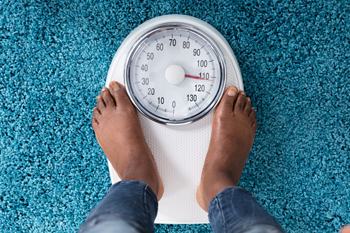 Research has indicated 1 billion people in the world are obese.This may play a significant role in causing uncomfortable foot conditions.This is a result of the added weight the feet must endure while completing daily activities. Obese patients may find difficulty in finding shoes that fit correctly, and this leads to foot pain. Additionally, performing regular exercise is helpful in losing extra weight. People who are overweight will find it beneficial to start an exercise routine slowly, and gradually increase the frequency. Walking is considered to be an excellent form of exercise, in addition to cycling, swimming, or weight lifting. If you would like more information about how obesity affects the feet, please consult a podiatrist who can provide you with the proper information.
Research has indicated 1 billion people in the world are obese.This may play a significant role in causing uncomfortable foot conditions.This is a result of the added weight the feet must endure while completing daily activities. Obese patients may find difficulty in finding shoes that fit correctly, and this leads to foot pain. Additionally, performing regular exercise is helpful in losing extra weight. People who are overweight will find it beneficial to start an exercise routine slowly, and gradually increase the frequency. Walking is considered to be an excellent form of exercise, in addition to cycling, swimming, or weight lifting. If you would like more information about how obesity affects the feet, please consult a podiatrist who can provide you with the proper information.
Obesity has become very problematic at this point in time and can have extremely negative effects on the feet. If you’re an obese individual and are concerned about your feet, contact one of our podiatrists from The Podiatry Center, PC. Our doctors can provide the care you need to keep you pain-free and on your feet.
Obesity and Your Feet
Since your feet are what support your entire weight when standing, any additional weight can result in pain and swelling. Being overweight is one of the main contributors to foot complications.
Problems & Complications
Extra Weight – Even putting on just a few extra pounds could create serious complications for your feet. As your weight increases, your balance and body will shift, creating new stresses on your feet. This uneven weight distribution can cause pain, even while doing the simplest tasks, such as walking.
Diabetes – People who are overweight are at serious risk of developing type-2 diabetes, which has a drastic impact on the health of your feet. As you get older, your diabetes might worsen, which could lead to loss of feeling in your feet, sores, and bruises. You could also become more prone to various infections.
Plantar fasciitis – Pressure and stress that is placed on muscles, joints, and tendons can trigger plantar fasciitis, which is an inflammation of tissue that forms along the bottom of the foot.
If you have any questions please feel free to contact our office located in Millburn, NJ. We offer the newest diagnostic and treatment technologies for all your foot and ankle needs.
Read more about How Obesity Affects Your FeetExercise and Obesity
 Research has indicated 1 billion people in the world are obese.This may play a significant role in causing uncomfortable foot conditions.This is a result of the added weight the feet must endure while completing daily activities. Obese patients may find difficulty in finding shoes that fit correctly, and this leads to foot pain. Additionally, performing regular exercise is helpful in losing extra weight. People who are overweight will find it beneficial to start an exercise routine slowly, and gradually increase the frequency. Walking is considered to be an excellent form of exercise, in addition to cycling, swimming, or weight lifting. If you would like more information about how obesity affects the feet, please consult a podiatrist who can provide you with the proper information.
Research has indicated 1 billion people in the world are obese.This may play a significant role in causing uncomfortable foot conditions.This is a result of the added weight the feet must endure while completing daily activities. Obese patients may find difficulty in finding shoes that fit correctly, and this leads to foot pain. Additionally, performing regular exercise is helpful in losing extra weight. People who are overweight will find it beneficial to start an exercise routine slowly, and gradually increase the frequency. Walking is considered to be an excellent form of exercise, in addition to cycling, swimming, or weight lifting. If you would like more information about how obesity affects the feet, please consult a podiatrist who can provide you with the proper information.
Obesity has become very problematic at this point in time and can have extremely negative effects on the feet. If you’re an obese individual and are concerned about your feet, contact one of our podiatrists from The Podiatry Center, PC. Our doctors can provide the care you need to keep you pain-free and on your feet.
Obesity and Your Feet
Since your feet are what support your entire weight when standing, any additional weight can result in pain and swelling. Being overweight is one of the main contributors to foot complications.
Problems & Complications
Extra Weight – Even putting on just a few extra pounds could create serious complications for your feet. As your weight increases, your balance and body will shift, creating new stresses on your feet. This uneven weight distribution can cause pain, even while doing the simplest tasks, such as walking.
Diabetes – People who are overweight are at serious risk of developing type-2 diabetes, which has a drastic impact on the health of your feet. As you get older, your diabetes might worsen, which could lead to loss of feeling in your feet, sores, and bruises. You could also become more prone to various infections.
Plantar fasciitis – Pressure and stress that is placed on muscles, joints, and tendons can trigger plantar fasciitis, which is an inflammation of tissue that forms along the bottom of the foot.
If you have any questions please feel free to contact our office located in Millburn, NJ . We offer the newest diagnostic and treatment technologies for all your foot and ankle needs.
Read more about How Obesity Affects Your FeetPossible Causes of Blisters
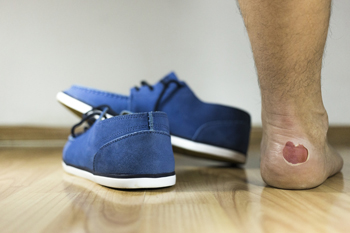 If you have ever experienced a blister, you are most likely familiar with the pain and discomfort that is generally caused from this condition. It can develop from wearing shoes that do not fit correctly. Friction happens as a result of a portion of the foot rubbing against a part of the shoe. This may damage the top layer of skin, and a blister will form as the body’s natural defense mechanism against a skin injury. It looks like small bubble, and is filled with a fluid that protects the raw skin. Once the skin has healed, the blister will naturally drain as new skin grows. Additional reasons why blisters occur can include severe burns, frostbite, or an allergic reaction to an insect bite. If you have a blister that is not healing, it is suggested to speak with a podiatrist who can advise you on proper care.
If you have ever experienced a blister, you are most likely familiar with the pain and discomfort that is generally caused from this condition. It can develop from wearing shoes that do not fit correctly. Friction happens as a result of a portion of the foot rubbing against a part of the shoe. This may damage the top layer of skin, and a blister will form as the body’s natural defense mechanism against a skin injury. It looks like small bubble, and is filled with a fluid that protects the raw skin. Once the skin has healed, the blister will naturally drain as new skin grows. Additional reasons why blisters occur can include severe burns, frostbite, or an allergic reaction to an insect bite. If you have a blister that is not healing, it is suggested to speak with a podiatrist who can advise you on proper care.
Blisters are prone to making everyday activities extremely uncomfortable. If your feet are hurting, contact one of our podiatrists of The Podiatry Center, PC. Our doctors can provide the care you need to keep you pain-free and on your feet.
Foot Blisters
Foot blisters develop as a result of constantly wearing tight or ill-fitting footwear. This happens due to the constant rubbing from the shoe, which can often lead to pain.
What Are Foot Blisters?
A foot blister is a small fluid-filled pocket that forms on the upper-most layer of the skin. Blisters are filled with clear fluid and can lead to blood drainage or pus if the area becomes infected.
How Do Blisters Form?
Blisters on the feet are often the result of constant friction of skin and material, usually by shoe rubbing. Walking in sandals, boots, or shoes that don’t fit properly for long periods of time can result in a blister. Having consistent foot moisture and humidity can easily lead to blister formation.
Prevention & Treatment
It is important to properly care for the affected area in order to prevent infection and ease the pain. Do not lance the blister and use a Band-Aid to provide pain relief. Also, be sure to keep your feet dry and wear proper fitting shoes. If you see blood or pus in a blister, seek assistance from a podiatrist.
If you have any questions, please feel free to contact our office located in Millburn, NJ. We offer the newest diagnostic and treatment technologies for all your foot care needs.
Read more about BlistersPossible Causes of Blisters
 If you have ever experienced a blister, you are most likely familiar with the pain and discomfort that is generally caused from this condition. It can develop from wearing shoes that do not fit correctly. Friction happens as a result of a portion of the foot rubbing against a part of the shoe. This may damage the top layer of skin, and a blister will form as the body’s natural defense mechanism against a skin injury. It looks like small bubble, and is filled with a fluid that protects the raw skin. Once the skin has healed, the blister will naturally drain as new skin grows. Additional reasons why blisters occur can include severe burns, frostbite, or an allergic reaction to an insect bite. If you have a blister that is not healing, it is suggested to speak with a podiatrist who can advise you on proper care.
If you have ever experienced a blister, you are most likely familiar with the pain and discomfort that is generally caused from this condition. It can develop from wearing shoes that do not fit correctly. Friction happens as a result of a portion of the foot rubbing against a part of the shoe. This may damage the top layer of skin, and a blister will form as the body’s natural defense mechanism against a skin injury. It looks like small bubble, and is filled with a fluid that protects the raw skin. Once the skin has healed, the blister will naturally drain as new skin grows. Additional reasons why blisters occur can include severe burns, frostbite, or an allergic reaction to an insect bite. If you have a blister that is not healing, it is suggested to speak with a podiatrist who can advise you on proper care.
Blisters are prone to making everyday activities extremely uncomfortable. If your feet are hurting, contact one of our podiatrists of The Podiatry Center, PC. Our doctors can provide the care you need to keep you pain-free and on your feet.
Foot Blisters
Foot blisters develop as a result of constantly wearing tight or ill-fitting footwear. This happens due to the constant rubbing from the shoe, which can often lead to pain.
What Are Foot Blisters?
A foot blister is a small fluid-filled pocket that forms on the upper-most layer of the skin. Blisters are filled with clear fluid and can lead to blood drainage or pus if the area becomes infected.
How Do Blisters Form?
Blisters on the feet are often the result of constant friction of skin and material, usually by shoe rubbing. Walking in sandals, boots, or shoes that don’t fit properly for long periods of time can result in a blister. Having consistent foot moisture and humidity can easily lead to blister formation.
Prevention & Treatment
It is important to properly care for the affected area in order to prevent infection and ease the pain. Do not lance the blister and use a Band-Aid to provide pain relief. Also, be sure to keep your feet dry and wear proper fitting shoes. If you see blood or pus in a blister, seek assistance from a podiatrist.
If you have any questions, please feel free to contact our office located in Millburn, NJ . We offer the newest diagnostic and treatment technologies for all your foot care needs.
